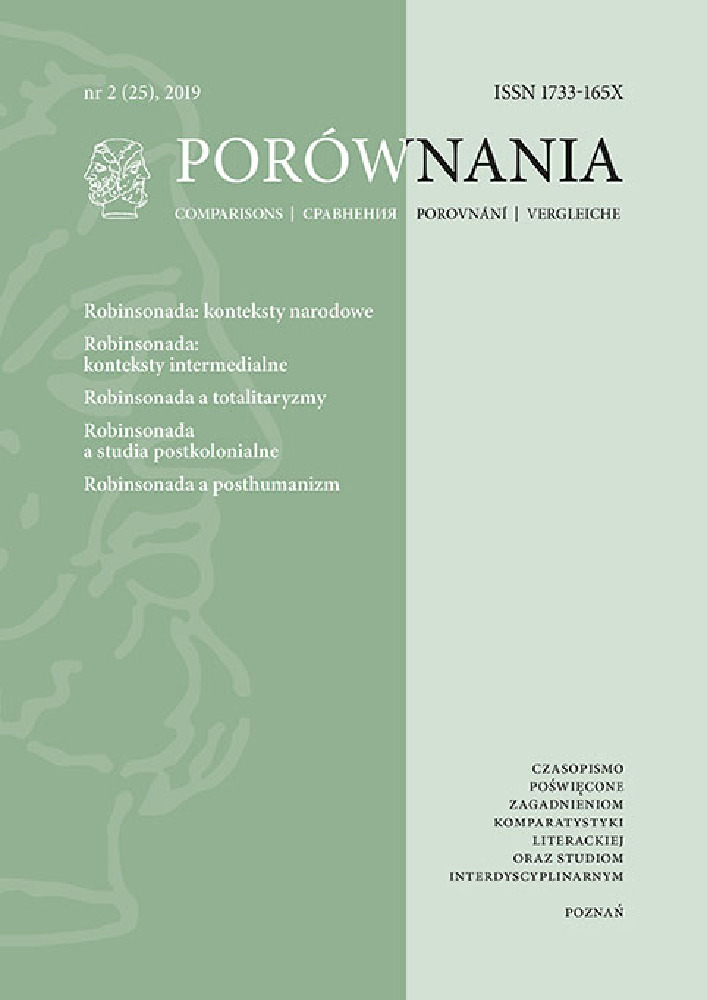Abstract
Following the publication of Robinson Crusoe, the Robinsonade genre became part of German literature tradition almost immediately. The contemporary novel in German language refers to the genre or to its characteristic motifs such as eremite in a hermetic (mainly insular) environment or a small group in abnormal social conditions. In the paper three variants of a modern Robinsonade are presented: (1) historical and political narrations that refer to past or contemporary politics critically, predominantly on the basis of postcolonial discourse; (2) postapocalyptic narrations that depict modern Robinsons after a catastrophe, in a future world or in outer space; (3) love stories where an island becomes a place of emotional relationship, utopian isolation and solitude of two lovers.
References
Baßler, Moritz. „Interpretation und Gattung“. Handbuch Gattungstheorie. Red. R. Zymner. Stuttgart/Weimar: J. B. Metzler, 2010. S. 54-56.
Defoe, Daniel. Przypadki Robinsona Kruzoe. Opr. W. L. Anczyc. Gdańsk: Tower Press, 2000 [wydanie pierwsze 1868].
Defoe, Daniel. Robinson Crusoe. Jego życia losy, doświadczenia i przypadki. Przeł. Franciszek Mirandola. Warszawa: Instytut Wydawniczy „Zdrój”, 1924 [wersja cyfrowa udostępniona na stronie: <https://wolnelektury.pl/katalog/lektura/robinson-crusoe/>. Web. 30.09.2019].
Defoe, Daniel. Robinson Crusoe. London: Joseph Mawman, 1815.
Graziadei, Daniel. „Nissopoiesis: Wie Robinsone ihre Inseln erzählen“. Handbuch Literatur & Raum. Red. J. Dünne, A. Mahler. Berlin/Boston: Walter de Gruyter, 2015. S. 421-430.
Jasnowski, Paweł. „Depresja i neoliberalny kapitalizm. Kilka uwag na marginesie Koali Lukasa Bärfussa”. Teksty Drugie 3 (2019). S. 283-304.
Krämer, Lisa. Das Motiv der Einsamkeit in den „Jonas-Romanen“ von Thomas Glavinic. Bamberg: University of Bamberg Press, 2015.
Lehr, Thomas. 42. München: dtv, 2017.
Masłowski, Damian. „L’analyse hypertextuelle de L’Empreinte à Crusoé de Patrick Chamoiseau”. Svět literatury – Časopis pro novodobé literatury. Special Issue: Le monde de la littérature (2015). S. 157-166.
Otto, Wolf Dieter. „»Insularisches Denken« und das Problem der Kulturbegegnung. Eine xenologische Skizze“. Aus Politik und Zeitgeschichte (Inseln) 32-33 (2018). S. 35-40.
Plummer, Patricia. „Robinsonade“. Metzler Lexikon Literatur. Begriffe und Definitionen. Red. D. Burdorf, Ch. Fasbender, B. Moenninghoff. Stuttgart/Weimar: J. B. Metzler, 2007. S. 656.
Schalansky, Judith. Atlas wysp odległych. Pięćdziesiąt wysp, na których nigdy nie byłam i nigdy nie będę. Przeł. Tomasz Ososiński. Warszawa: Dwie Siostry, 2013.
Seiler, Lutz. Kruso. Przeł. Dorota Stroińska. Kraków: Wydawnictwo Uniwersytetu Jagiellońskiego, 2017.
Stuhlfauth, Mara. Moderne Robinsonaden. Eine gattungstypologische Untersuchung am Beispiel von Marlen Haushofers Die Wand und Thomas Glavinics Die Arbeit der Nacht. Würzburg: Ergon, 2011.
Tommek, Heribert. „Wendejahr 1995 – Einführung“. Wendejahr 1995. Transformationen der deutschsprachigen Literatur. Red. H. Tommek, M. Galli, A. Geisenhanslüke. Berlin/Boston: Walter de Gruyter, 2015. S. 1-7.
Ullrich, Heiko. „Lutz Seilers Kruso – soziale Utopie, pastoraler Feuilletonroman und pikareske Robinsonade“. Alman Dili ve Edebiyatı Dergisi – Studien zur deutschen Sprache und Literatur 2 (2015). S. 47-58.
Zollitsch, Jan-Martin. „Guam als Archipel? Einführung in die Island Studies“. Aus Politik und Zeitgeschichte (Inseln) 32-33 (2018). S. 41-46.
License
Utwory opublikowane w czasopiśmie „Porównania”, na platformie Pressto należącej do Uniwersytetu im. Adama Mickiewicza w Poznaniu są udostępniane na licencji Creative Commons Uznanie autorstwa - Bez utworów zależnych 4.0 Międzynarodowe (CC BY-ND 4.0)
Tym samym wszyscy zainteresowani są uprawnieni do korzystania z utworów opublikowanych pod następującymi warunkami:
-
uznania autorstwa — czyli obowiązek podania wraz z rozpowszechnianym utworem informacji o autorstwie, tytule, źródle (odnośniki do oryginalnego utworu, doi) oraz samej licencji
-
bez utworów zależnych — remiksując, przetwarzając lub tworząc na podstawie utworu, nie wolno rozpowszechniać zmodyfikowanych treści.
-
brak dodatkowych ograniczeń — nie można korzystać ze środków prawnych lub technologicznych, które ograniczają innych w korzystaniu z utworu na warunkach określonych w licencji.
Uniwersytet im. Adama Mickiewicza w Poznaniu zachowuje prawo do czasopisma jako całości (układ, forma graficzna, tytuł, projekt okładki, logo itp.).
Autor zachowuje prawa majątkowe, ale udziela zgody Uniwersytetowi im. Adama Mickiewicza w Poznaniu na wykorzystanie dzieła. Autorzy tekstów zakwalifikowanych do publikacji proszeni są o wypełnienie podpisanie i przesłanie umowa (PL) agreement (EN)
Agreement for granting a royalty-free license to works with a commitment to grant a CC sub-license




